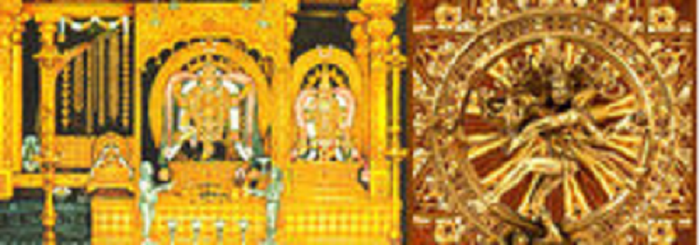Chidambaram
This is a collection of articles archived for the excellence of their content. Readers will be able to edit existing articles and post new articles directly |
Contents |
Taste Chidambaram’s Creative Impulse
By: Pranav Khullar
Chidambaram is believed to be the site of the original cosmic lingam, an ellipsoid around which the rest of the universe rotates. The dance of creative bliss is said to have been performed by Shiva on Poosam day of the Tamil month of Thai in February, for the two sages, Vyghrapada and Patanjali, who had asked for the boon to witness the dance. As the curtain is pulled back to reveal the inner sanctum , one is drawn into the world of Nirakara Shiva, where the vast expanse of the sky above and the ether zone are mirrored in the 'Akasha Lingam ' of Chidambaram. But is it as abstract as it seems, for the Thillai mangrove forest ground of the Chidambaram temple is witness to the Ananda Tandava dance of Shiva as Nataraja , fountainhead of the creative impulse.
Which one is the more seminal attribute of Shiva -- is it the ascetic yogic aspect characterised by dispassionate withdrawal and penance, a call beyond the contours of mind? Or is it the creative, pulsating energy of Shiva, which calls for an active engagement with the world, in the realisation that the outer embodied dimensions of the universe and human body, both emanate from and reflect the disembodied One, that the materiality is also actually spiritual only?
The Creative Yogi
Moving into the main dance hall of the Chidambaram complex, i marvel at the persona of Shiva, where different attributes complement each other. His all-encompassing compassion and love for devas and asuras alike, without discriminating between the two, reveals a Being in love with creation -- not a destroyer. Perhaps what he seeks to destroy is the negativity and baser elements of human nature.
Tevaram hymns and Tirumurai compendium of songs in Tamil eulogise these very attributes of Shiva, placing him at the heart of all spiritual seeking, as well as regard him as the bestower of all worldly boons as Ashutosh, the One who melts at the call of a sincere prayer. The Dikshitar priest leads me to the hall where the Periyapuranam , the sacred text on the lives of 63 Saivite saints called the Nayanars , is supposed to have been written ---- considered the fifth Veda in Tamil , the epic narration of the Nayanars establishes Shiva Bhakti and Shiva’s Grace as the surest path to liberation from bondage of mind.
God, Soul And Bondage
The Tirumurai tradition maps out the philosophy of Shaiva Siddhanta , with its formulation of three eternal entities, of God , soul and bondage -- Pati, pasu and paasam . The Saiva Siddhanta states that God is one, souls are many, and bondage happens because of the three impurities of anava which cause negativity of soul; karma, the law of action-reaction and maya, cause of all materiality. Maya is real in Shaiva Siddhanta, and not an illusion as in Vedanta. Shiva’s Grace alone can help in breaking of this bondage and evolution of the soul to an understanding of the relationship between the nirakara aspect of the Self and the dynamic aspect of the Self’s energy as it manifests .
Seers say that Shiva is finally the divine within. But the inscrutable and beautiful outer form of Shiva gives as much solace. Chidambaram gives me a beautiful taste of both.
